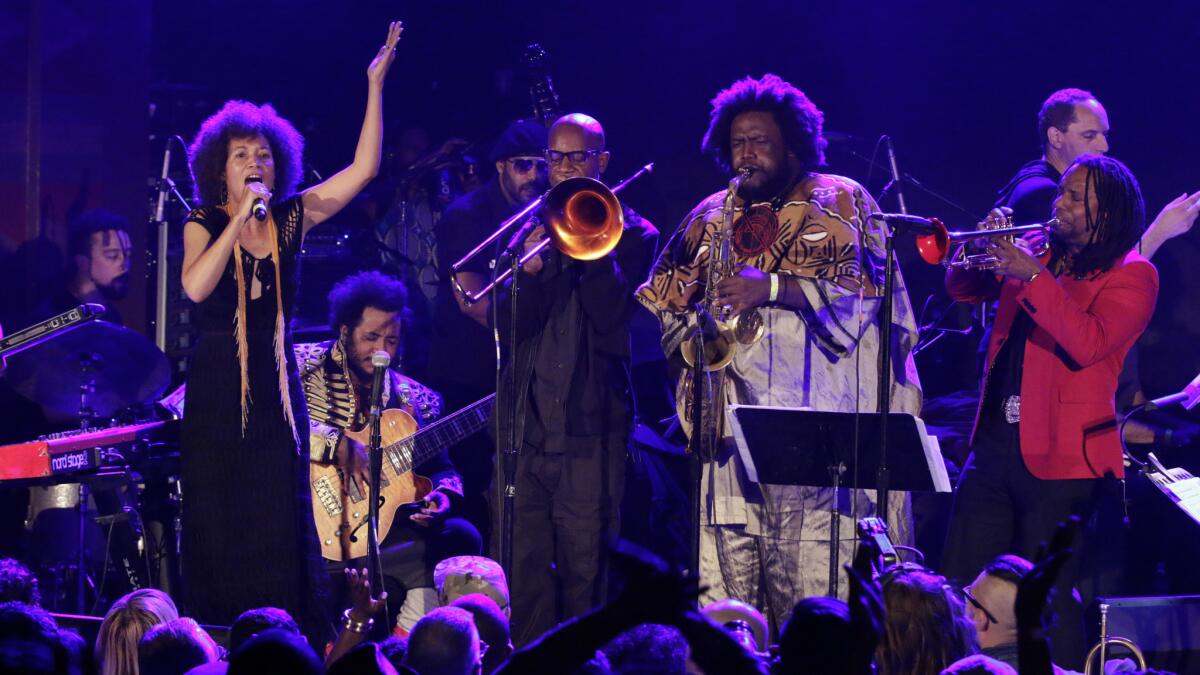Review: Kamasi Washington and band prove ‘The Epic’ hype, thrill a sold-out Regent

Perhaps it was a self-fulfilling prophecy, saxophonist Kamasi Washington introducing his massive three-disc jazz collection called “The Epic” on a Monday night to a sold-out, audibly electric crowd. With a title like that, the dozens of musicians packing the stage -- brass, strings, keyboards, choir, percussion and bass -- had better deliver.
What occurred at the Regent in downtown Los Angeles went down as advertised, to say the least. A singular night of Los Angeles music that had the vibe of the historic, the concert demands documentation, requires a time stamp and as many people as possible yowling and bellowing at its wonder. History, as Washington apparently understands, doesn’t make itself.
A wild combination of exuberance, focus, dexterity, creativity, rhythmic fractals, inhalation, exhalation, sweat and intent, his set lived up to the promise.
Best known these days for his work on rapper Kendrick Lamar’s majestic new album “To Pimp a Butterfly,” Washington has performed with artists including Herbie Hancock, Nas, Lauryn Hill and Flying Lotus. He and his band worked on “The Epic” for years and explored its nuances through countless residencies and sessions. You could hear all that effort and energy in the astounding first note of the night.
Delivered in unison by all 28-odd musicians (by my count, not including guests), the introductory din blew through the room like a monsoon. The song it introduced: “Change of the Guard.” Indeed. Am I the only one who got misty-eyed and tingly as it blew?
“The Epic” (Brainfeeder) was presented in its entirety, stitched together through musical segues and transitions to a crowd that seemed the cream of the city’s jazz scene. Hip dudes with pillbox afros stood next to aged veterans. Tall musicianly types gawked at pianist Cameron Graves’ twisted solos, wondered on keyboard player Brandon Coleman’s way with the Moog Liberation first-generation keytar. Rap freaks nodded at the dueling drum-kits and conga beats. One rickety jazz guy, who’d rolled his oxygen tank past the sound board and sat on a portable stool, expressed awestruck delight at the turnout.
His friend wondered if he’d survive the night. But what a way to die.
Onstage Washington gathered a community so imposing that it was almost a town, including arranger and violist Miguel Atwood-Ferguson guiding the strings and choir, electric bassist Stephen “Thundercat” Bruner and drummer/brother Ronald Bruner, percussionists Tony Austin and Leon Mobley and trombonist Ryan Porter.
Washington’s father, the saxophonist Rickey Washington, guested throughout the night. The ascendant producer and alto saxophone player Terrace Martin arrived for “Seven Prayers,” where he maneuvered through a solo that expanded on the melody of the gospel standard “Wade in the Water.”
Vocalist Patrice Quinn added dynamic melody lines to “Henrietta Our Hero,” about Washington’s grandmother. Sage jazz singer Dwight Trible offered back-line texture. Guest DJs including Gaslamp Killer, Battlecat and Ras G wove synthetic textures. Between sets, spinners including Low End Theory founder Daddy Kev, spiritual jazz DJ and producer Carlos Nino and avant hip hop producer-visual artist Teebs connected dots.
What Washington accomplished wasn’t pastiche. It was banging, booming, swinging, defiantly modern music with runaway-train momentum.
Washington and crew delivered the work through three sets that lasted at least four hours. Not all fans, though, were hearty enough. By the time the set ended after midnight, the eardrums were humming and exhausted and those of us with morning deadlines snuck out to recover. There’s only so high the workers of the world can fly on a Monday night. The artists? Much, much higher.
The sets were all the more exciting because this was a club show, and felt like one: raucous, wild, with random screams of encouragement both onstage and off, audible gasps at key moments. Trumpeter Dontae Winslow doubled as hype-man, egging on the soloists, pushing them, cheerleading. As he blew his horn it seemed hot to the touch, melting the notes, turning frequencies into vapor. Upright bassist Miles Mosely anchored the bottom, trading lines with Thundercat and his hollow-body six-string bass and its freakazoid tones.
Look, I’m not a jazz critic and jazz fans have chided me in the past for overstepping my “pop music critic” title. But I was schooled in the glory of the music while working in record shops for a decade -- places where the jazz heads ran the turntables with lessons and dictates on classic Impulse, Blue Note, ESP-Disc, Riverside and Saturn titles.
On Monday night I felt like I was hearing all those lessons simultaneously -- all that history, all those sounds and ideas ideas both compressed and expanded upon. It felt important. It felt new.
Jazz these days is so scattered and diffuse that it can seem irrelevant. The most prominent gigs are on college campuses, at European festivals or in stuffy concert halls. The current iTunes jazz top 10 is occupied by artists including Diana Krall, Boney James, Frank Sinatra, Kenny G and Harry Connick. The current No. 2 seller, though, bodes well: It’s “The Epic.”
The artist proved his was an epic -- sorry, there’s no other word -- pure understanding of what things can still be, the proverbial shape of jazz to come.
Follow Randall Roberts on Twitter: @liledit
More to Read
The biggest entertainment stories
Get our big stories about Hollywood, film, television, music, arts, culture and more right in your inbox as soon as they publish.
You may occasionally receive promotional content from the Los Angeles Times.











